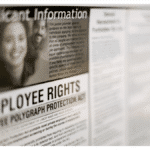Estimated reading time: 7 minutes
Today’s reader question is very timely. Many organizations are asking telling demanding that employees return to the office. So, making sure that the office is ready for them will be important. And by ready, I mean compliant when it comes to employment law posters.
Hello! I am hoping to pick your brain since you have so much experience and are now consulting and have created this lovely site! I just reviewed one of your labor law articles, but I am still unsure of how to move forward with my situation.
I’m the HR Manager of a tech company that has 18 U.S. based employees, and our office is in Florida. We purchased the FL labor law poster and have our FL employees covered, but I am unsure about the remote employees. What digital poster do they need? Is it the Florida one since the company is based in Florida? Or is it their state specific poster because they work remotely in that state?
I haven’t been able to find a direct answer so far and want to ensure we are compliant for the rest of the year. Any information you can provide is greatly appreciated!
HR Bartender is delighted to have a long-standing partnership with Poster GuardÒ Compliance Protection, a division of HRdirect. So, I reached out to Ashley Kaplan, Esq., senior corporate counsel for HRdirect, to see if she would share her knowledge with us. Thankfully, she said yes.
Please remember that Ashley’s comments should not be construed as legal advice or as pertaining to any specific factual situations. If you have specific detailed questions, they should be addressed directly with your friendly neighborhood labor attorney.
Ashley, thanks for being here. This reader note mentions that they have 18 employees. Is there a minimum number of employees before an organization needs to display labor law posters? If so, what is it?
[Kaplan] Employers must comply with federal, state, city, and county posting requirements. On the federal level, most of the postings (4 out of 6) apply even if the employer only has one employee. On the state and local levels, the same general rule applies. The majority of labor law postings apply to all employers regardless of employee size. There are some exceptions, such as the federal Equal Employment Opportunity (EEOC) posting which applies to employers with 15 or more employees, and the Family and Medical Leave Act (FMLA) poster for those with 50 or more employees companywide.
(Editor’s Note: As a reminder, the six mandatory federal notices that most employers are required to post include: Equal Employment Opportunity (EEOC), Employee Polygraph Protection Act (EPPA), Fair Labor Standards Act (FLSA), Family and Medical Leave Act (FMLA), Occupational Safety and Health Act (OSHA) and the Uniformed Services Employment and Reemployment Rights Act (USERRA).)
Here’s a two-part question regarding remote employees. For part one, we’ve written about this before, but as a refresher…do remote employees need labor law posters? Can the company provide a handout instead of a poster?
[Kaplan] Employers are required to provide mandatory workplace postings to all employees, regardless of where they work. That includes remote workers and home-based employees.
According to the U.S. Department of Labor (DOL), if an employee does not come into the office where the physical posters are displayed at least 3-4 times per month, the postings should be provided in an alternate format, such as electronically (for employees with email/internet access).
Employee ‘handouts’ are completely different, and typically refer to legal notices employers must personally distribute to employees at various points in the employment relationship, such as:
- Upon hire,
- On employee anniversaries,
- When there are pay status changes,
- When an employee becomes pregnant,
- When an employee becomes injured or requests a leave of absence, and
- Upon termination.
Each state and locality has different requirements. For the most part, these ‘handout’ requirements are separate and apart from workplace posting requirements. There are a few overlapping notices, but as a general rule the handout notices are separate and must be distributed in addition to the workplace posters. Each handout requirement is unique when it comes to the distribution method, but in most cases electronic delivery is acceptable.
The second part of this question about remote employees and labor law handouts is one we haven’t discussed before. Does the notice need to be for the state the employee lives in or the state that the organization is based in?
[Kaplan] Unfortunately, it’s not always clear which state laws apply in this instance. Most basic employment rights — such as minimum wage, overtime, and safety issues — are governed by the laws where the employee performs the work. However, depending on how your company is structured, your out-of-state employees may be covered by both states’ laws. Your notices (handouts and posters) should correspond with the actual employment laws applicable to each employee. Because it depends on so many factors, we recommend you consult with an attorney if you are unsure which employment laws apply to your employees, and it is always safe in the meantime to provide the notices for both states.
I know Poster Guard offers a labor law poster service. Does the labor law service include handouts for remote employees?
One option provides a custom link employers can post on their internal websites to give employees 24/7 access to the poster images, and one provides the digital posters directly to each employee by email, with full tracking of their acknowledgments for recordkeeping.
For the additional ‘handout’ notices that employers must personally distribute at various stages of the employment relationship, Poster Guard offers a comprehensive solution covering every handout requirement at the federal, state, and local levels. The Mandatory Employee Handout Service provides immediate access to a database of all required handout notices, includes attorney-written instructions for each handout (including permissible distribution methods), sends alerts whenever there are new or updated requirements, and allows for unlimited internal use of the files for the annual membership term.
Last question. One of the things this reader didn’t mention was future hiring. If the company continues to grow (and we hope they do!), then they will want to make sure new employees get the right notices. What can the organization do to make sure they remain in compliance?
[Kaplan] The Mandatory Employee Handout Service includes all handout notifications that are required for new hires under federal, state, city, and county employment laws. Poster Guard’s legal team keeps the notices up-to-date to ensure the right notices are available at the right time for ongoing compliance as you onboard new employees. With more than 100 mandatory handout updates and more than 200 mandatory poster updates in 2022 alone, it is critical to rely upon an experienced provider with a dedicated legal team keeping on top of these rapidly evolving legal requirements.
I want to extend a huge thanks to Ashley for sharing her knowledge with us. If you’re looking for additional information about managing employment law posters, check out Poster Guard’s on-demand webinar on “Posting Compliance and Lawsuits – Why You Should Care”.
In addition to placing your company at risk of legal fines and penalties, a real breakdown of trust can happen if an employee discovers that the organization isn’t maintaining compliance. An employee will start thinking, “If the company didn’t tell me about this, what else haven’t they told me?” Having a process in place for employees to receive the required employment law notices tells employees that the organization cares about doing the right thing.
38









